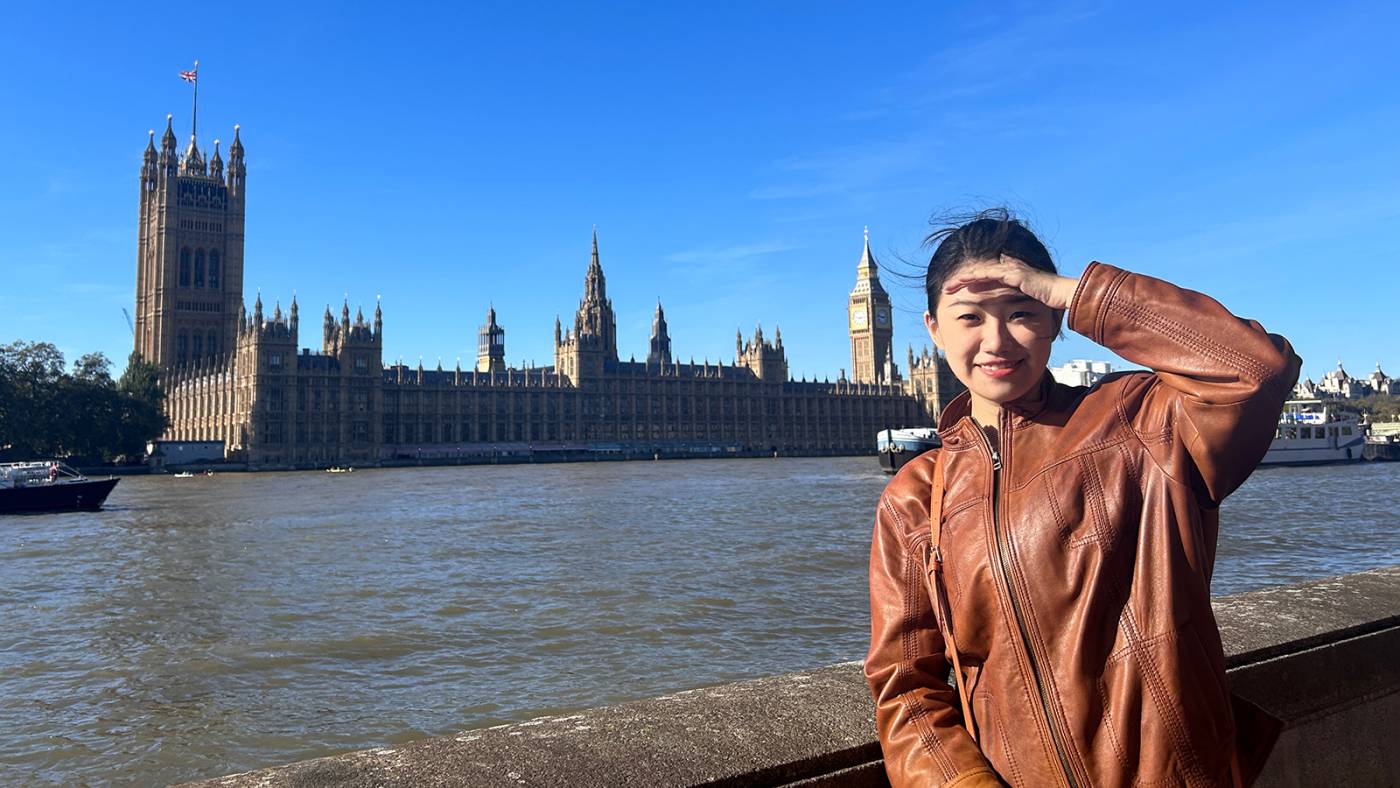Meet Jiafei from China, she studied the course online and is now studying Architectural Design MArch at UCL.

What’s your background?
I originally hail from the northern Chinese city of Suihua.
For my undergraduate studies, I pursued a degree in Environmental Design, which allowed me to explore various aspects of architectural space design and their relationship with the environment.
Currently, I am a postgraduate student at University College London (UCL), majoring in architectural design.
Why did you choose to study the Pre-sessional online?
When I got the conditional offer, I decided to enrol in a Pre-sessional English course.
The main reason was that I wanted to understand the teaching mode and academic writing methods of the university. The course is specially designed for academic English, unlike IELTS.
The Pre-sessional English course focuses on the ability of academic writing and document searching, and simulates the situation that students would encounter in a Master's programme with their own professional knowledge, which can help students develop important skills needed for graduate courses. It also helps students adapt to the English environment in advance.
Online courses are chosen because they are more convenient. Students can study where they are located, which makes it easier for students and saves on accommodation costs when learning in the UK.
Secondly, UCL has perfect network connection equipment and excellent security consultants, you don't have to worry about the situation of online courses.
Which degree are you studying now and what is it like?
I am currently enrolled in an MArch programme in Architectural Design. This course primarily explores emerging directions at the intersection of architecture and technology, such as machine construction and architectural interaction. The programme offers access to B-made workshop facilities and a wide array of advanced resources.
My main research focus is autonomous buildings in conjunction with artificial intelligence. I greatly enjoy being exposed to new technologies and software throughout the course. Additionally, UCL provides a robust platform for students, including the impressive B-made workshop and library resources, which offer substantial support for our postgraduate studies.
Since I was an art student in my undergraduate period and rarely involved in programming languages, the biggest challenge for me was to step out of my comfort zone to learn programming and read a lot of computer-related articles. However, researching in new fields allows me to approach architectural design from different perspectives, and each time I successfully master a new technology, it gives me a great sense of accomplishment.
How has the Pre-sessional English course helped you in your degree?
Pre-sessional English classes are a great way to practice speaking and emphasise communication skills, both written and oral. It can improve your ability to express ideas clearly, which is essential for academic discussions, presentations and collaborative projects.
In addition, the Pre-sessional English course can boost your confidence in using English as a means of communication. It encourages students not to be afraid of expressing their views but to actively engage with teachers and peers, presenting their work in the classroom.
What was the biggest challenge you faced during your time on the Pre-sessional and how did you overcome it?
Transitioning from the traditional teaching model to the flipped learning approach in the Pre-sessional English course was initially challenging.
Students are expected to independently study the course material before class, allowing the teacher to focus on addressing questions during class while providing ample time for students to share their perspectives. This highly effective teaching method not only enhances communication skills as students engage in discussions, ask questions and seek clarification but also provides a deeper understanding of the course material.
What advice would you give to future students who will be taking online Pre-sessional English course?
Create a dedicated study space at home with a reliable internet connection. This will help you stay focused and complete your assignments in the online class. Make sure you have a reliable internet connection and the necessary technical equipment.
I do not recommend taking a Pre-sessional English course while working, because it requires a lot of time and energy to take it seriously, and extra work arrangements may disrupt your study schedule and delay the course.
What is the most interesting thing you’ve done, seen or got involved with at UCL so far?
One of the most interesting experiences I have had in UCL was participating in the B-pro show of the Bartlett School of Architecture, which comprehensively displayed the course results of the previous session.
The design works displayed at the exhibition fully reflect the diversity and innovation of UCL's course content, and each work is an exploration and practice of the cutting-edge field of architecture, which can give people a lot of inspiration.
How is the UK education system different to your home country?
In the Master's programme in Architectural Design, teachers place more emphasis on independent learning and critical thinking.
The role of teachers is not only to impart knowledge, but also to encourage students to participate in discussions, propose their own ideas, and conduct research. So I had to spend a lot of time on self-directed learning, which was quite different from the more traditional, lecture-oriented teaching style in my hometown.
Where is your favourite place on campus and why?
My favorite place on campus is the B-made workshop, which provides powerful creative and collaborative resources, such as 3D printing, laser cutting and other advanced equipment, which can meet the manufacturing and technical needs of students in the course project, providing a rich creative space.
This type of resource is often very important for students' practical projects and innovative activities, as they support their ideas and designs to become reality.
 Close
Close

